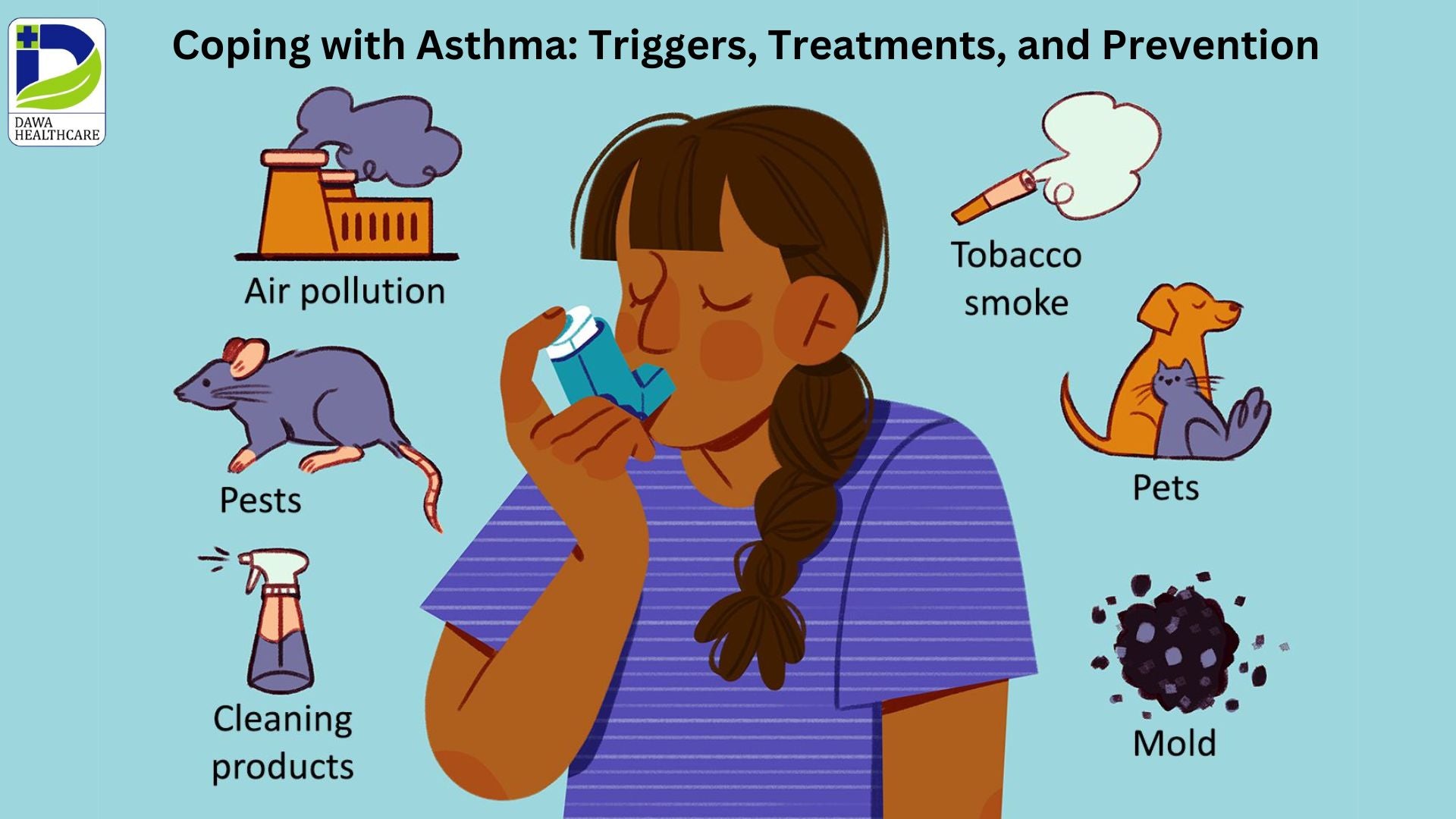
Coping with Asthma: Triggers, Treatments, and Prevention
If you or someone you know deals with asthma, you're likely familiar with the challenges it presents like the struggle to catch your breath or the worry that comes with unexpected triggers. Understanding asthma can empower you to take control! We have compiled this detailed blog to uncover common triggers, effective treatment options, and actionable prevention strategies to help you or your loved ones cope better with asthma.
Understanding Asthma Triggers
Common asthma triggers include:
- Allergens: Pollen, dust mites, mold, and pet dander can initiate asthma attacks in sensitive individuals. Identifying and controlling exposure to these allergens is very important.
- Environmental Factors: Air pollution, strong odors, and smoke can worsen asthma symptoms. Outdoor activities during high pollution days should be avoided to reduce exposure.
- Weather Changes: Cold air or sudden changes in weather can also trigger asthma symptoms. Individuals should dress warmly in cold weather and avoid abrupt temperature shifts.
- Physical Activity: For some people, exercise can induce asthma symptoms. Understanding one’s limits and using preventive measures is essential for exercising safely.
Asthma Treatment Options
When it comes to managing asthma, a range of treatment options is available. It is important to work with a healthcare provider to determine the best approach for individual needs. The primary asthma treatment options include:
- Inhaled Corticosteroids: These medications reduce inflammation in the airways and are the most commonly prescribed long-term control medication. They are effective for many patients and can significantly improve lung function.
- Bronchodilators: Short-acting bronchodilators provide quick relief from asthma symptoms by relaxing the muscles around the airways.
- Biologics: For those with severe asthma, biologic therapies target specific pathways in the inflammatory process, offering relief from symptoms and reducing the frequency of attacks.
Among these, finding the best inhalers for asthma relief is essential. Patients should consult with their healthcare provider to choose the most suitable inhaler based on their specific needs and lifestyle.
Managing Asthma Symptoms Naturally
In addition to prescribed medications, there are several natural approaches to managing asthma symptoms naturally. Here are some effective strategies:
- Breathing Exercises: Techniques such as diaphragmatic breathing and pursed-lip breathing can improve lung function and reduce shortness of breath.
- Stay Hydrated: Drinking plenty of water can help thin mucus in the airways, making it easier to breathe.
- Nutrition: A healthy diet rich in fruits, vegetables, and omega-3 fatty acids can reduce inflammation in the body. Foods such as apples, berries, and fatty fish are beneficial.
- Stress Management: Stress and anxiety can trigger asthma symptoms. Practicing mindfulness, yoga, or meditation can help alleviate stress levels and improve overall well-being.
How to Prevent Asthma Attacks
Preventing asthma attacks is essential for maintaining a good quality of life. Lets have a look at some expert tips on how to prevent asthma attacks:
- Create an Asthma Action Plan: Work with a healthcare provider to develop a personalized asthma action plan. This plan should include information on daily management, when to take medications, and how to handle worsening symptoms.
- Identify and Avoid Triggers: Keep a diary to track symptoms and identify potential triggers. Once detected, take necessary steps to avoid these triggers as much as possible.
- Maintain an Asthma-Friendly Home Environment: Implementing asthma-friendly home environment tips is essential for minimizing exposure to allergens and irritants. Regular cleaning, using air purifiers, and keeping humidity levels in check can create a more comfortable living space.
- Regular Check-ups: Frequent visits to a healthcare provider help to make sure that asthma is well-managed and medications are adjusted as needed.
Exercise Tips for People with Asthma
Exercise is important for everyone, including those with asthma. However, individuals with asthma may need to take specific precautions. Here are some exercise tips for people with asthma:
- Warm Up: Gradually warming up before exercise can help prevent asthma symptoms from occurring during physical activity.
- Choose the Right Environment: Opt for indoor exercise when pollen counts are high or during cold weather.
- Incorporate Breathing Exercises: Including breathing exercises in your routine can improve lung capacity and improve overall respiratory function.
Bottom Line
Coping with asthma involves understanding triggers, exploring treatment options, and implementing prevention strategies. Regular communication with healthcare providers and a proactive approach can pave the way for better asthma management and overall health. With the right strategies in place, living with asthma can be manageable. Whether you need your asthma medicines at any time of the day or night, you can place an online order at Dawa Healthcare. At our medical store in Pakistan, we have all the necessary medicines available all the time.

